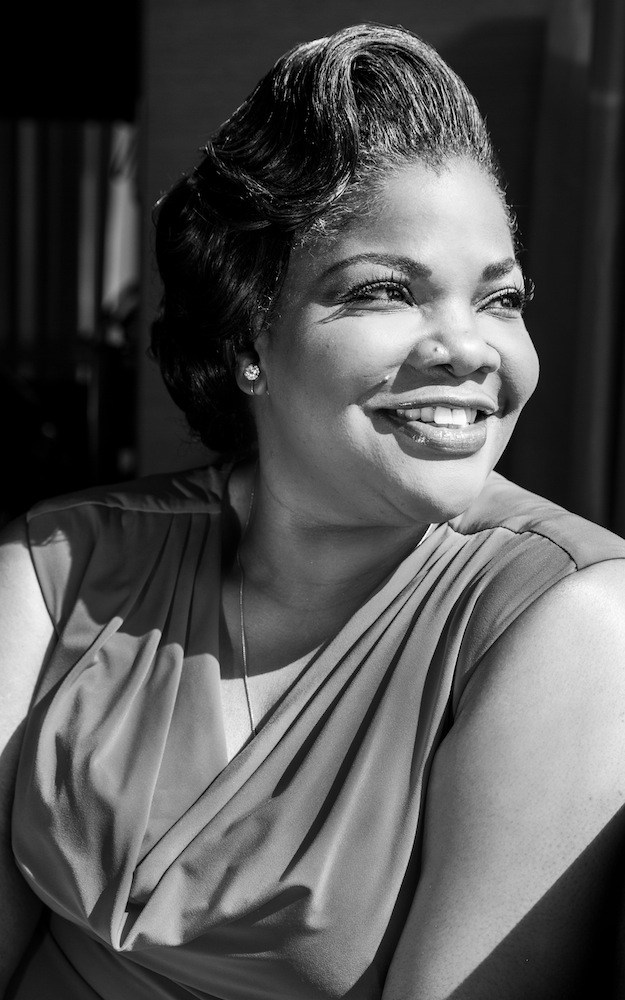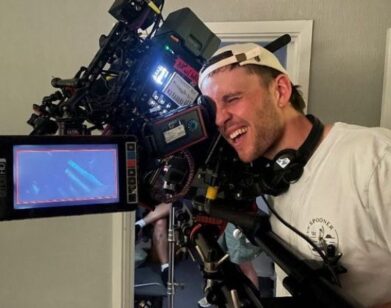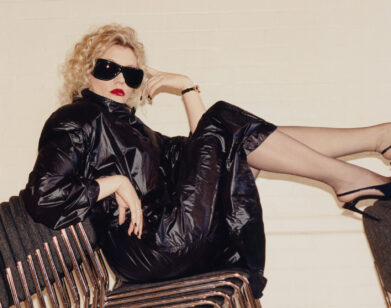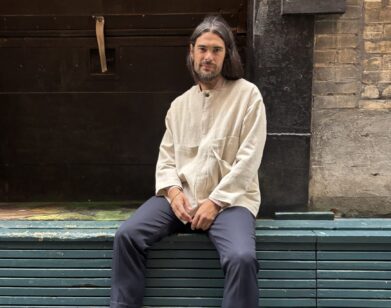Don’t You Know I’m Mo’Nique?

ABOVE: MO’NIQUE IN NEW YORK, APRIL 2015. PORTRAIT BY FRANK SUN.
Mo’Nique never intended to become an actress. The 47-year-old Baltimore-native began her career in stand-up comedy. When she moved to Hollywood, it was to become a talk show host. “Becoming an actress was something that just fell in my lap,” she explains. “I don’t want to audition, because that’s not what I do, but if you want me to do it and it makes sense, then I’ll do it.”
Fifteen years after her first film, however, and Mo’Nique is more than just an actress: she’s a first-name-only Oscar winner (she won the Best Supporting Actress Award for her role in Lee Daniel‘s Precious) and a producer of television (Flavor of Love Girls: Charm School) and film (About, Blackbird). She’s the sort of character actor who receives scripts with “someone like Mo’Nique” written in the breakdown of the role (“That always makes me chuckle,” she says. “Don’t they know I’m Mo’Nique?”).
This weekend, Mo’Nique will appear in HBO’s Bessie, a biopic of 1920s and 30s American blues singer Bessie Smith directed by Dee Rees and co-starring Queen Latifah (Bessie), Michael Kenneth Williams (Bessie’s husband Jack G), Michael Epps, and Oliver Platt. Mo’Nique plays Ma Rainey, Bessie’s no-nonsense mentor and a cultural icon in her own right. Born in the 1880s, Rainey was one of the first professional blues singers to record her work; she’s sometimes referred to as “the Mother of Blues.”
EMMA BROWN: How much did you know about Ma Rainey and Bessie Smith before you signed on?
MO’NIQUE: Absolutely nothing. I had never heard of Ma Rainey before, and the only thing I knew about Bessie Smith was her name. After reading that script, it was like, “Wow. How did we lose these women in our history books?” Because what they did for music, for the world, was absolutely amazing.
BROWN: Did you know who else was going to be involved when you signed up for the film? Were you familiar with Dee Rees?
MO’NIQUE: The only one I knew was involved was Queen Latifah. Dee Rees, I had never worked with before. [She’s] a young sister who wrote this amazing script, and you felt like those people back then sat down with her and said, “We want to share our story with you.” For her to capture those lives like that, I couldn’t wait to play with that director. I hadn’t seen Pariah before Bessie, but I saw it not too long ago.
BROWN: What made Ma Rainey pop off the page for you?
MO’NIQUE: She was a woman who stood in her strength, who was unapologetic about who she was—a smart businesswoman. She also knew how to share. I think oftentimes what we don’t see is husband and wife teams; it was Ma Rainey and Pa Rainey and she was showing that partnership and business can work, and you can share in that. She was also willing to share her craft, what she knew of it, the business side, the fun side. Whatever she had, she was willing to say, “Let me share my experiences with you.”
BROWN: Do you find that people in the entertainment industry are generally giving like that? Or was Ma Rainey special in that sense?
MO’NIQUE: Ma Rainey was very special.
BROWN: Bessie’s first husband and manager, Jack G, didn’t seem like a wonderful partner.
MO’NIQUE: I don’t know about that. I think they were what they needed for each other at the time. I think he was a great guy, as she was a great woman, but at the time, it’s what they needed for one another, and you got to really see the dynamic of what goes on when they’re both fighting for their position. So I don’t know that he wasn’t a great guy—I think he was a good guy—it’s just at a part in their life when it came to a head: “We both can’t be the boss. We both can’t be the chief.” They came to an understanding that he had to go, just for his survival.
BROWN: Do you need to like a character in order to play them?
MO’NIQUE: You need to understand it. I don’t know so much if you have to like them. I think you have to respect their story and what you’re putting out. The most challenging character I’ve ever played is Mary Jones, from the movie Precious, and initially you don’t like her, but when you understand that she has a mental illness, you have empathy for her. I think that was the one character that made me go in initially saying, “Ugh.” But the once you got into her, you understood that she was just sick. I remember Mr. Daniels was talking about an acting coach, all these things, and the greatest advice I’ve ever gotten was from my husband Sidney: “Mama, don’t judge her, be her. When you just be, watch what you get.”
BROWN: Do you think everyone deserves empathy?
MO’NIQUE: Yes. I think all of us have that thing about us—maybe a million people can’t see it, but one person says, “I see them hurting in a different kind of way,” or “I relate to them in a different kind of way, and I want to empathize with what they’re dealing with.”
BROWN: Do you remember your first show as a stand-up comedian?
MO’NIQUE: I remember my first show. I remember my first joke.
BROWN: What was your first joke?
MO’NIQUE: I remember walking up on stage and saying, “Y’all better put your hands together for my fat black ass.” That was over 25 years ago [and] that was the first time I got a standing ovation. That’s what made me say, “I like the way this feels.”
BROWN: Have you ever died on stage?
MO’NIQUE: I’ve never [knocks on wood] died on stage. There was one time, in the beginning of my career, I really didn’t understand my audience. I was at a nightclub, but I didn’t know that the people there were from a church group having their church sessions, so I was doing a nightclub act in front of a church club session. But there were two drunk women over on the side—they gave me so much motivation.
BROWN: Did you grow up watching comedy?
MO’NIQUE: I don’t know about watching it, but you heard it. And you heard the greats like Richard Pryor, LaWanda Page, Redd Foxx, Eddie Murphy. Once you started hearing them and what they did and how they made people feel—their truths—I wanted to be a part of it.
BROWN: Were you a funny, outgoing kid? Were you the class clown?
MO’NIQUE: I wasn’t the class clown because I thought I was too cute to be the class clown. [laughs] But I’ve always had an enjoyment of telling stories.
BROWN: Do find that there’s a distinction between drama and comedy in terms of what it takes out of you? Do you find one more challenging that the other?
MO’NIQUE: No, because it’s playtime. May I be up on stage doing comedy, may I be on set, it’s playtime. It’s that little girl in her bathroom saying, “One day.” And now that that one day is here, it’s that same little girl, she’s just walking in the midst of the dream.
BROWN: Aside from Precious, is there one role in particular that people come up to you about?
MO’NIQUE: Nikki Parker from The Parkers. I can be anywhere in the world, and someone will say, “Nikki Parker, can you say, ‘Hey, Professor Ogelvee.'” It makes not a difference where I land, Nikki Parker is one of those characters that I think, for the rest of time, she’ll live on.
BROWN: Have you ever felt that excited about seeing someone famous?
MO’NIQUE: Patti LaBelle. I was 17 years old and I went to a concert of hers. She had just lost her grandmother, and I watched that woman be so unafraid to show her emotions on stage. She cried—she was really going through it. After the show, I watched that woman hug every person that was in the line that waited for a hug. And when it got to be my turn, the way she hugged me was as if I was number one, and I was way back in that line. I said at that moment, “If I’m ever given the opportunity, when it’s my turn, I’ll make sure I hug every person that wants to be hugged and hug me back.” That one thing right there has stayed with me through my entire career.
BROWN: I know at one point you had the rights to Hattie McDaniel’s life and wanted to develop a biopic. Are you still working on that?
MO’NIQUE: Hattie and I had a conversation, and she said, “Mo’Nique, my story has already been told. How many times can you tell a story about a black woman who was underpaid, overused, abused in ways that’s unexplainable, and then we die broke and alone? My story’s already been told.” She told me it was time to tell another story.
BROWN: What story do you want to tell?
MO’NIQUE: I got introduced to her, her name is Ma Rainey. When you really pay attention to that story, that woman had land, a beautiful home, she owned businesses, she didn’t die the way that we’re portrayed it has to happen. She was a wealthy woman with love and fullness, and she was complete. She left such a beautiful blueprint on how you can be a successful businesswoman, how you don’t have to die broke with nothing and no family. She said, “If you want to know how it can be done, just take a look at the story.” So I thank Hattie for directing me to Ma Rainey.
There are so many great stories that are buried in our history that we know nothing about. There’s the story of Ida B. Wells—the way that’s she’s briefly spoken about in our history books, “She was a civil rights fighter,” she was so much more than that. She was that woman that said, “I won’t bow down. I won’t be mistreated. You will show me some respect.” She was that woman, again, died wealthy, had a beautiful family, a man that loved her. And she fought for what was right, even though it wasn’t popular. There are so many stories. Mahalia Jackson, one of the—if not the—greatest gospel singers, but then you find out that she was just a gospel singer, not this “god is everything.” They were smart businesswomen. So there are so many of our stories that need to be told for us to understand the richness that we come from that will push us even further.
BESSIE AIRS THIS SATURDAY, MAY 16, ON HBO.






